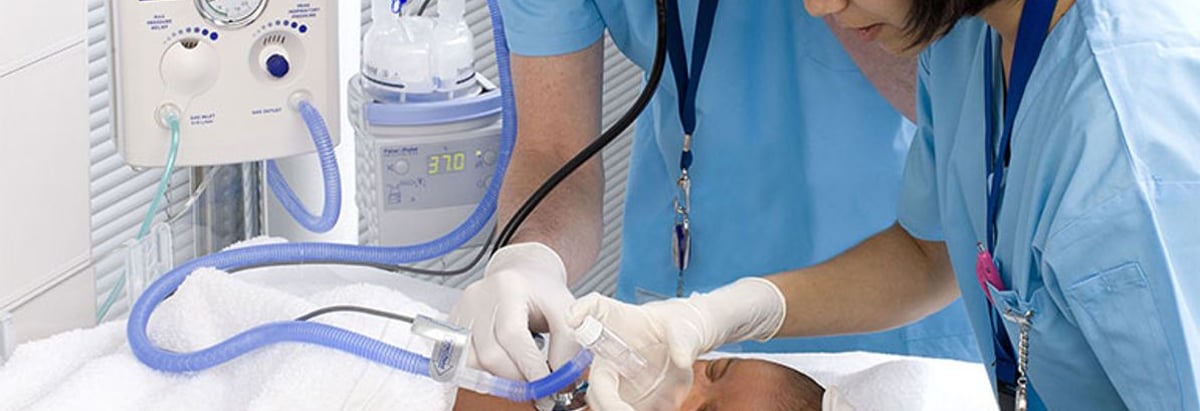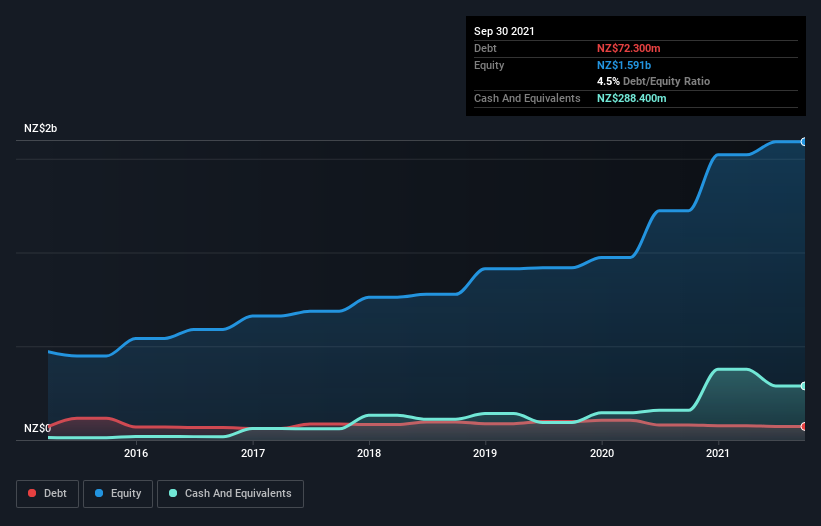- New Zealand
- /
- Medical Equipment
- /
- NZSE:FPH
Does Fisher & Paykel Healthcare (NZSE:FPH) Have A Healthy Balance Sheet?

Some say volatility, rather than debt, is the best way to think about risk as an investor, but Warren Buffett famously said that 'Volatility is far from synonymous with risk.' When we think about how risky a company is, we always like to look at its use of debt, since debt overload can lead to ruin. Importantly, Fisher & Paykel Healthcare Corporation Limited (NZSE:FPH) does carry debt. But is this debt a concern to shareholders?
When Is Debt Dangerous?
Debt is a tool to help businesses grow, but if a business is incapable of paying off its lenders, then it exists at their mercy. Part and parcel of capitalism is the process of 'creative destruction' where failed businesses are mercilessly liquidated by their bankers. However, a more usual (but still expensive) situation is where a company must dilute shareholders at a cheap share price simply to get debt under control. Of course, the upside of debt is that it often represents cheap capital, especially when it replaces dilution in a company with the ability to reinvest at high rates of return. When we examine debt levels, we first consider both cash and debt levels, together.
View our latest analysis for Fisher & Paykel Healthcare
How Much Debt Does Fisher & Paykel Healthcare Carry?
The image below, which you can click on for greater detail, shows that Fisher & Paykel Healthcare had debt of NZ$72.3m at the end of September 2021, a reduction from NZ$80.2m over a year. However, it does have NZ$288.4m in cash offsetting this, leading to net cash of NZ$216.1m.

How Strong Is Fisher & Paykel Healthcare's Balance Sheet?
The latest balance sheet data shows that Fisher & Paykel Healthcare had liabilities of NZ$314.3m due within a year, and liabilities of NZ$140.3m falling due after that. Offsetting this, it had NZ$288.4m in cash and NZ$248.6m in receivables that were due within 12 months. So it can boast NZ$82.4m more liquid assets than total liabilities.
Having regard to Fisher & Paykel Healthcare's size, it seems that its liquid assets are well balanced with its total liabilities. So it's very unlikely that the NZ$16.1b company is short on cash, but still worth keeping an eye on the balance sheet. Succinctly put, Fisher & Paykel Healthcare boasts net cash, so it's fair to say it does not have a heavy debt load!
In addition to that, we're happy to report that Fisher & Paykel Healthcare has boosted its EBIT by 35%, thus reducing the spectre of future debt repayments. The balance sheet is clearly the area to focus on when you are analysing debt. But ultimately the future profitability of the business will decide if Fisher & Paykel Healthcare can strengthen its balance sheet over time. So if you're focused on the future you can check out this free report showing analyst profit forecasts.
Finally, a company can only pay off debt with cold hard cash, not accounting profits. While Fisher & Paykel Healthcare has net cash on its balance sheet, it's still worth taking a look at its ability to convert earnings before interest and tax (EBIT) to free cash flow, to help us understand how quickly it is building (or eroding) that cash balance. Looking at the most recent three years, Fisher & Paykel Healthcare recorded free cash flow of 46% of its EBIT, which is weaker than we'd expect. That's not great, when it comes to paying down debt.
Summing up
While we empathize with investors who find debt concerning, you should keep in mind that Fisher & Paykel Healthcare has net cash of NZ$216.1m, as well as more liquid assets than liabilities. And it impressed us with its EBIT growth of 35% over the last year. So is Fisher & Paykel Healthcare's debt a risk? It doesn't seem so to us. Over time, share prices tend to follow earnings per share, so if you're interested in Fisher & Paykel Healthcare, you may well want to click here to check an interactive graph of its earnings per share history.
At the end of the day, it's often better to focus on companies that are free from net debt. You can access our special list of such companies (all with a track record of profit growth). It's free.
New: AI Stock Screener & Alerts
Our new AI Stock Screener scans the market every day to uncover opportunities.
• Dividend Powerhouses (3%+ Yield)
• Undervalued Small Caps with Insider Buying
• High growth Tech and AI Companies
Or build your own from over 50 metrics.
Have feedback on this article? Concerned about the content? Get in touch with us directly. Alternatively, email editorial-team (at) simplywallst.com.
This article by Simply Wall St is general in nature. We provide commentary based on historical data and analyst forecasts only using an unbiased methodology and our articles are not intended to be financial advice. It does not constitute a recommendation to buy or sell any stock, and does not take account of your objectives, or your financial situation. We aim to bring you long-term focused analysis driven by fundamental data. Note that our analysis may not factor in the latest price-sensitive company announcements or qualitative material. Simply Wall St has no position in any stocks mentioned.
About NZSE:FPH
Fisher & Paykel Healthcare
Designs, manufactures, markets, and sells medical device products and systems in North America, Europe, the Asia Pacific, and internationally.
Flawless balance sheet with high growth potential.

